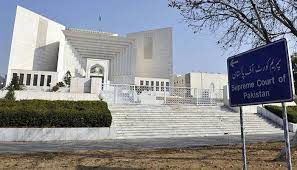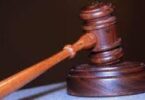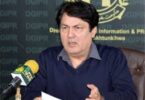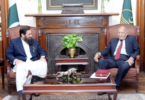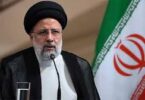ISLAMABAD (Agencies): Chief Justice of Pakistan (CJP) Umar Ata Bandial on Tuesday warned the executive against interfering with the Supreme Court’s affairs. Coming down hard on the Attorney General for Pakistan (AGP) Mansoor Uman Awan, the top judge asked: “How can you say that two judges, including the chief justice, are involved in the matter?”
The CJP’s remarks came during the apex court’s hearing on a set of petitions filed against the constitution of a high-powered judicial commission tasked to inquire into the various audio leaks of members of the judiciary. The SC bench — which also comprises Justice Ijaz ul Ahsan, Justice Munib Akhtar, Justice Syed Hasan Azhar Rizvi, and Justice Shahid Waheed — has taken up four separate petitions filed by Supreme Court Bar Association (SCBA) President Abid Shahid Zuberi, SCBA Secretary Muqtedir Akhtar Shabbir, Pakistan Tehreek-e-Insaf (PTI) Chairman Imran Khan and Advocate Riaz Hanif Rahi.
All petitions requested the apex court to declare the commission’s formation illegal. It is pertinent to note that during the hearing of the petitions on May 28, the same bench suspended the notification that formed the bench and stayed the commission’s working. Ahead of the hearing today, Zuberi, submitted to the bench a number of orders of different high courts, requesting that these documents be considered for “proper adjudication” of the present case. These orders included previous rulings from the apex court itself, the Islamabad High Court, and the Lahore High Court.
At the outset of the hearing, AGP Usman opened his arguments with discussions on the “conflict of interest” of judges hearing the petition. The CJP, taking issue with the “allegation” said that the apex court is a constitutional office that has its own powers. “A judge cannot be made a party to a contempt petition,” he said, adding that a chief justice cannot be asked to leave a bench upon allegations.
“The powers of the chief justice or judge cannot be reduced as per requirement,” he said. When the AGP said that the government had raised objections against the formation of the bench hearing the appeals, the top judge asked: “How can there be a discussion on the assumption that two judges, including the chief justice, had personal benefits in the case?” He warned the executive to refrain from interfering in the powers of the court. “We were not even consulted before the commission was formed,” he said. He then told the AGP to first prove that his petition could be adjudicated and said: “Objections cannot be raised against judges on mere allegations.”
Justice Akhtar raised questions over the government’s right to publicise the audio leaks. He directed the AGP to discuss the commission’s Terms of Reference (TORs), and asked: “Is the government asserting that the audios are original?” He then asked the AGP if it were true that the hacker leaked the audio and the minister made it public by holding a press conference.
“The interior minister held a press conference regarding the audio leaks, was the matter related to him?” he asked wondering if the audios should have been made public without thorough investigation. “According to the law, can a government official accuse a judge before confirming the facts?” he asked.
When the AGP defended the government saying that ministers’ statements could not be attributed to the government, Justice Akhtar asked: “Are the government’s policy and ministers’ statements not the same?” He added that if a minister speaks of his own will, it will be a statement of the cabinet. “After everything that has been said in the ministerial press conferences, what is the status of the application?” he asked.
The CJP then asked if the government had used its resources to find out where and how the audios are being recorded. AGP Usman responded that the government has formed a commission for a complete investigation of the audio, including who recorded them and how. At this, CJP Bandial asked: “Did you find out anything about Indibell?” “Check out Indibell’s Twitter handle, is he operating from outside the country or from within?” he asked. He then expressed concerns that anyone could spread false news against judges using Indibell. Justice Akthar then observed that there are negative aspects of social media.
After the AGP, Zuberi’s counsel Shoaib Shaheen presented his arguments and said that the government did not include an investigation into the source of the audio leaks in the TORs. Furthermore, he said, the audios were assumed to be true and it was presumed that the judiciary’s independence had been compromised.
“All the audios started coming after the suo moto notices [taken by the supreme court] concerning the Punjab elections,” Shaheen pointed out. Shaheen further alleged that the Pakistan Electronic Media Regulatory Authority (Pemra) is not keeping a check on what is being broadcast.
“[IHC Judge] Justice Mohsin Akhtar Kayani banned the broadcasting of audio-video leaks,” he said, “however, despite the ban, the leaked audios was broadcast, and the Pemra did not take any notice”. He said an attempt had been made to discredit the judiciary. “Parliament passed a resolution, suspending the Supreme Court’s decision and the Constitution,” he said. The petitioner’s lawyer said the top court is the “last hope” for justice. Drawing the bench’s attention to the PTI political workers who had been arrested and were being tried in courts, he said: “The worst violation of fundamental rights is happening in the country. People are looking towards the Supreme Court.”

